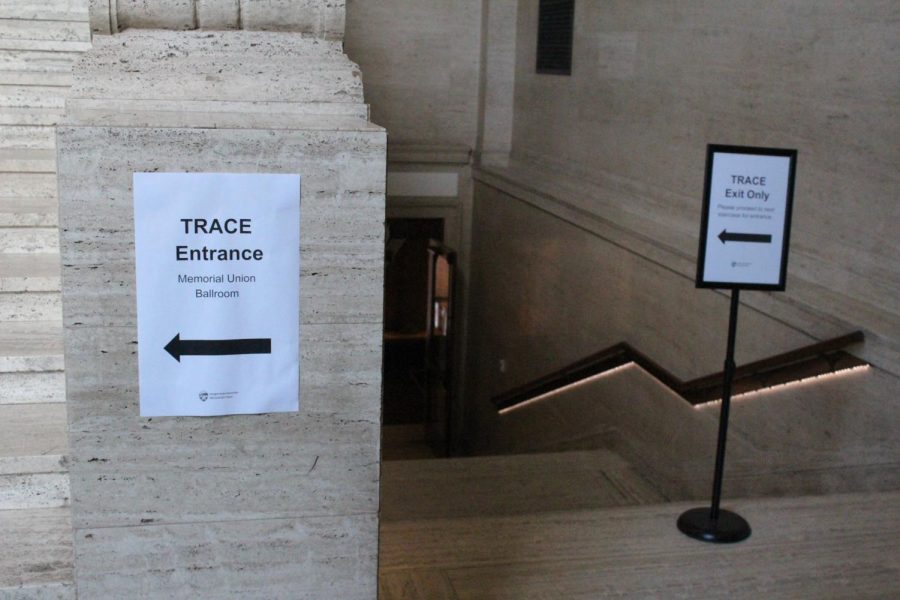TRACE OSU requires on-campus residents to test weekly for COVID-19, encourages all students to sign up for testing
March 8, 2021
Oregon State University informed students that all on-campus residents are required to be tested weekly by TRACE OSU for COVID-19.
According to an email sent out by University Housing and Dining Services on Feb. 2, testing not done through TRACE OSU will not fulfill this requirement. Failure to complete a TRACE COVID-19 test each week may result in removal from the residential community and referral to the Office of Student Conduct and Community Standards for additional conduct action.
Students living on campus receive an email each week including a new COVID-19 testing invitation QR code unique to them. Students will need to show the QR code invite at one of the two testing locations on the Corvallis campus: on the south side of Reser Stadium or in the Memorial Union ballroom.
TRACE testing on the OSU campus is available Monday through Thursday, 9 a.m. to 5 p.m.
Steve Clark, vice president of university relations and marketing, said via email that there is benefit to the TRACE testing offered by OSU.
“TRACE OSU testing is immediately available within walking distance on campus for students and provides timely testing results to students – and to the university if a student tests positive,” Clark said. “Notice of positive cases allows Student Health Services to offer health services support and contact tracing.”
TRACE OSU also works in close partnership with UHDS, which they can then track which students have or have not been tested and provide the proper services to residents in living communities. Outside services do not have the same contact and cooperation with university services.
According to the email from UHDS to on-campus residents, students will receive test results via their ONID email approximately 72 hours after being tested for COVID-19. If the test is positive, a Student Health Services representative will contact the student to discuss what they need to do and answer any questions.
Erika Carrillo, graduate student working with TRACE, said that each COVID-19 test can run at around $125 to $150, which OSU provides at no additional cost to students; this makes the testing efficient.
“It goes by really quick,” Carrillo said. “I think it takes longer to get there than the actual test itself.”
However, students do have the option of quarantining if they prefer to not participate in testing.
Dave Craig, deputy COVID-19 response coordinator, said via email that cases on the Corvallis campus have been rising throughout winter term. In response, TRACE has decided to proactively increase testing among students residing in the residence halls.
“We also are asking students to be especially mindful of public health measures by continuing to self-monitor for symptoms daily, wearing face coverings, limiting social gatherings to six people or less,” Craig said. “[And] adhering to OSU’s physical distancing policy both on and off campus, cooperating with contact tracing, and contacting their health care provider or Student Health Services if they think they may be ill with COVID-19.”
Clark said that although members of OSU fraternities and sororities are offered testing, OSU cannot require students who are off-campus to be tested for COVID-19. However, he strongly encourages members of sororities and fraternities to be tested, as well as all OSU students in the Corvallis, Bend or Newport areas to enroll in TRACE OSU.
Ezra Affoumado, an undergraduate student working with TRACE, said that one of the biggest challenges working for the organization is getting the community signed up for testing.
“I’ve definitely seen a decline in response rate,” Affoumado said. “We want to test so many people, and people aren’t coming in as much as we want them to come.”
Through the mandatory testing, Affoumado said he hopes that more students understand the reasoning behind testing in general and to encourage more students to sign up.
“The ultimate goal is to re-open campus and not shut it down more than it is already,” Affoumado said.
Both student workers — Affoumado and Carrillo — highlighted that bringing the community together through testing is one of the significant roles that TRACE OSU has as an organization.
“This is such a great opportunity for all of us to be proactive and be involved in our community and know the prevalence of COVID-19 in our community,” Carrillo said. “It’s so important that we have an idea how to manage or slow the spread of COVID-19 in our community and work collectively.”
























































































































